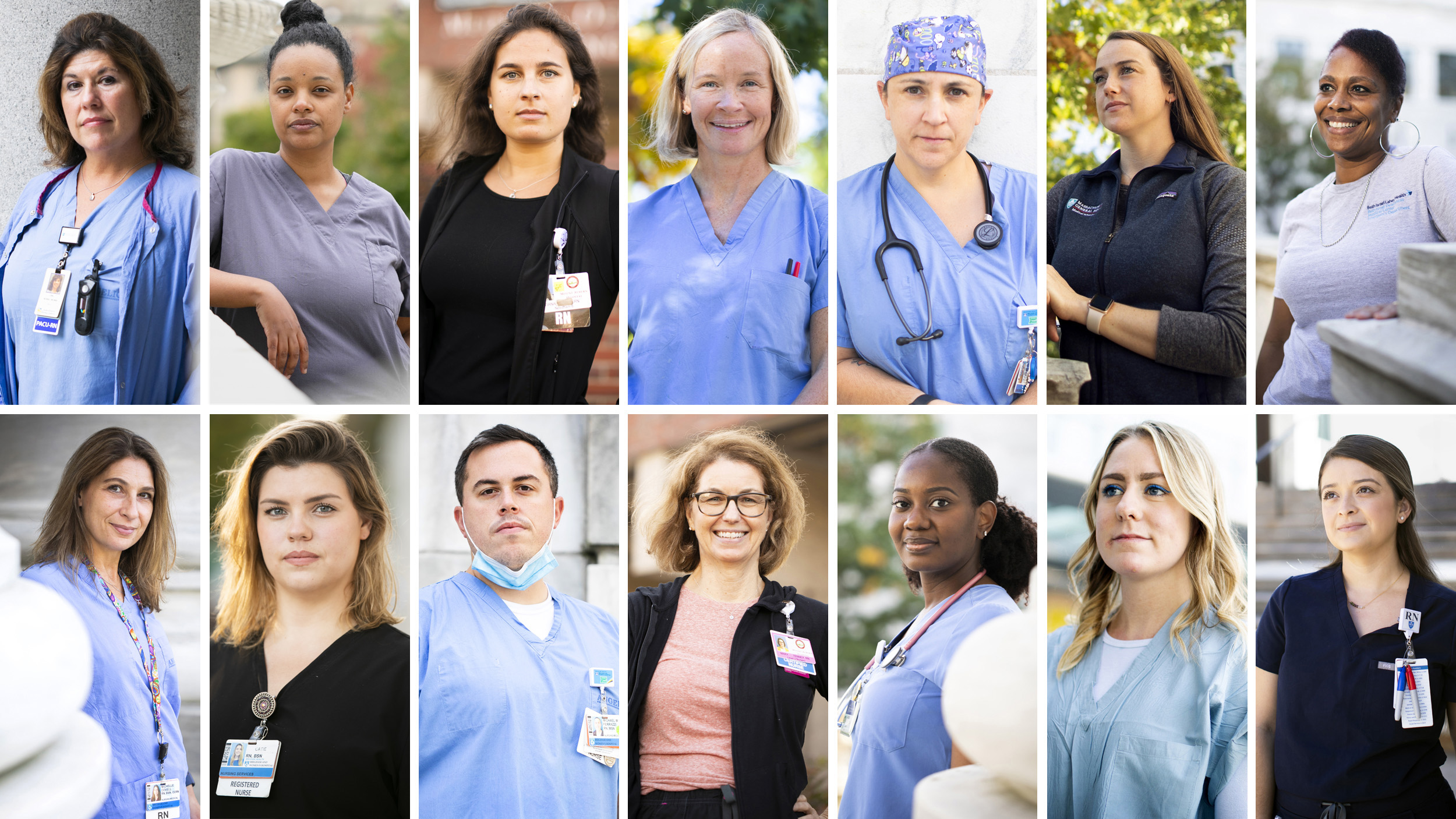
Photos by Stephanie Mitchell/Harvard Staff Photographer
Love, death, fear, guilt, pride, hope, friendship, alienation, and so much sorrow. Through it all, they kept showing up.
14 nurses on life and work during COVID
Since early 2020, when the pandemic exploded around the world, Massachusetts has seen nearly 19,000 COVID deaths and more than 840,000 cases. If a line graph of hospital admissions over the past 20 months looks like a series of peaks and valleys, the initial surge was Mount Everest for the state’s medical facilities, with patient loads and death rates that have not been matched since. To understand how the crisis has felt for frontline workers caring for the sick and dying, the Gazette reached out to 14 nurses at four Harvard-affiliated hospitals, many of whom work in intensive-care units. When the pandemic began, some had just started their careers, while others had been on the job for years. They risked their lives to stand by their patients, and their stories are marked by hope, heartbreak, and resilience.
***
“It’s never easy to witness my patients suffering, but I never gave up on any of them. I held out hope and prayed that each would survive.”
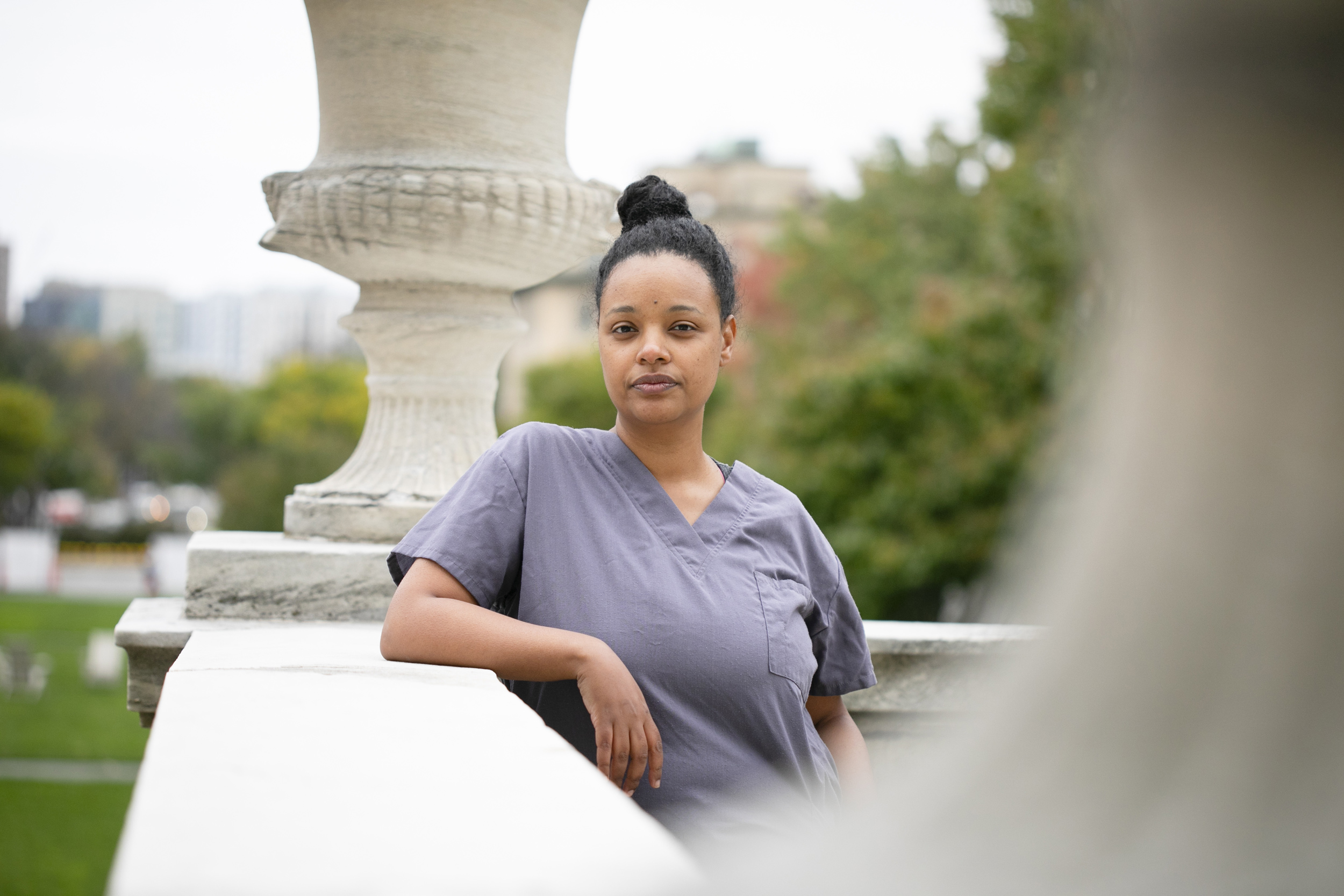
Afomia Bekele
Brigham & Women’s Hospital, Boston
I work on the gynecology surgical oncology inpatient floor, but during the pandemic, the entire floor converted into a COVID-19 inpatient unit. Working with these patients brought extraordinary challenges. First, I went through extreme anxiety and fear of being exposed to the virus and carrying it home to my family. In addition, the work was incredibly taxing. Nurses jumped in on many other job duties on the COVID floor in order to reduce the use of personal protective equipment. We fed patients, cleaned up after them, made video and audio calls with their loved ones. Through all this, seeing these patients deteriorate and having several heartbreaking discussions with family members was an emotional roller-coaster. The patients in this unit had low oxygen levels and could suddenly become critically ill. Of course, it’s never easy to witness my patients suffering, but I never gave up on any of them. I held out hope and prayed that each would survive. I cheered each patient that I discharged home, and seeing them reunite with a family member put a smile on my face. Most of all, I appreciated the support I received from my family. That encouraged me to keep going.
***
“The unknown was frightening, but the urgency the pandemic placed on health care workers all over the world didn’t allow us to sit in that fear or uncertainty for too long.”
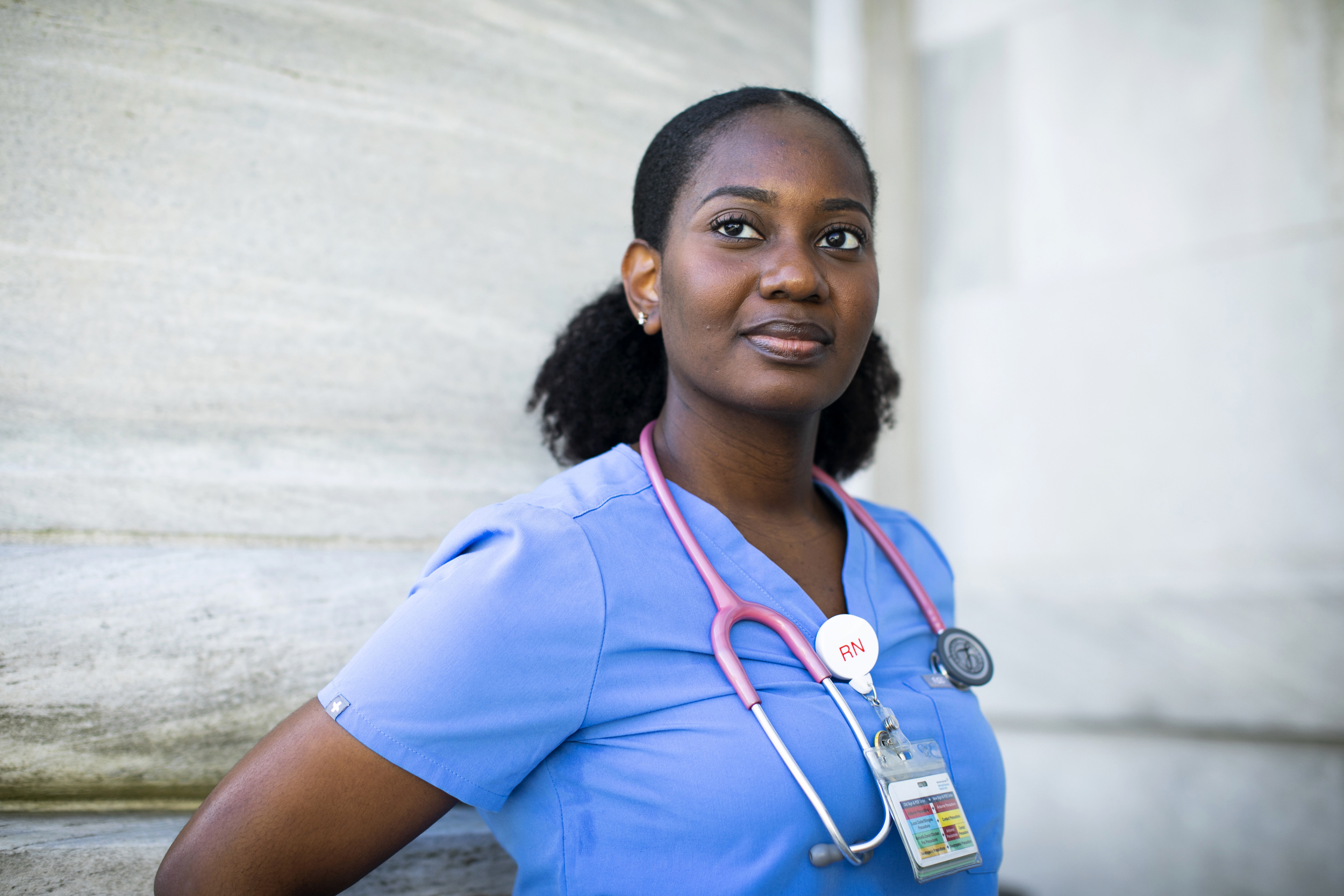
Rachel Bresilla
Beth Israel Deaconess Medical Center, Boston
March 2020, my fast-paced medical-surgical unit came to an abrupt halt. John Ryan, our nursing director, informed us that our unit would be transitioning to a 36-bed COVID intensive-care unit. We were then whisked away to a four-hour crash course on “how to be a critical-care support nurse.” What I remember next is a unit filled with ventilated COVID patients. I vividly remember the fear that banded my co-workers and myself together and a sense of uncertainty that was felt throughout the medical center. The unknown was frightening, but the urgency the pandemic placed on health care workers all over the world didn’t allow us to sit in that fear or uncertainty for too long. Our patients needed us, their families were trusting us, and we were called to act, adapt, and help save as many of those precious lives we cared for as possible. I look back to that time with great pride. Pride in the devoted care we provided for each person in those hospital beds. Pride in how the Beth Israel Deaconess Medical Center community came together to support and encourage us in every way imaginable. Great pride in every hospital staff member who showed up every day despite the unknown. The year 2020 undoubtedly marked us all in a unique, defining way. For me, it’s the year I silenced fear, rose to the challenge, persevered, and embodied the year of the nurse.
***
“The intensive-care units were unrecognizable, with large numbers of very sick patients. … With all the personal protective equipment we were wearing, you could not identify who a person was or their role on the unit.”
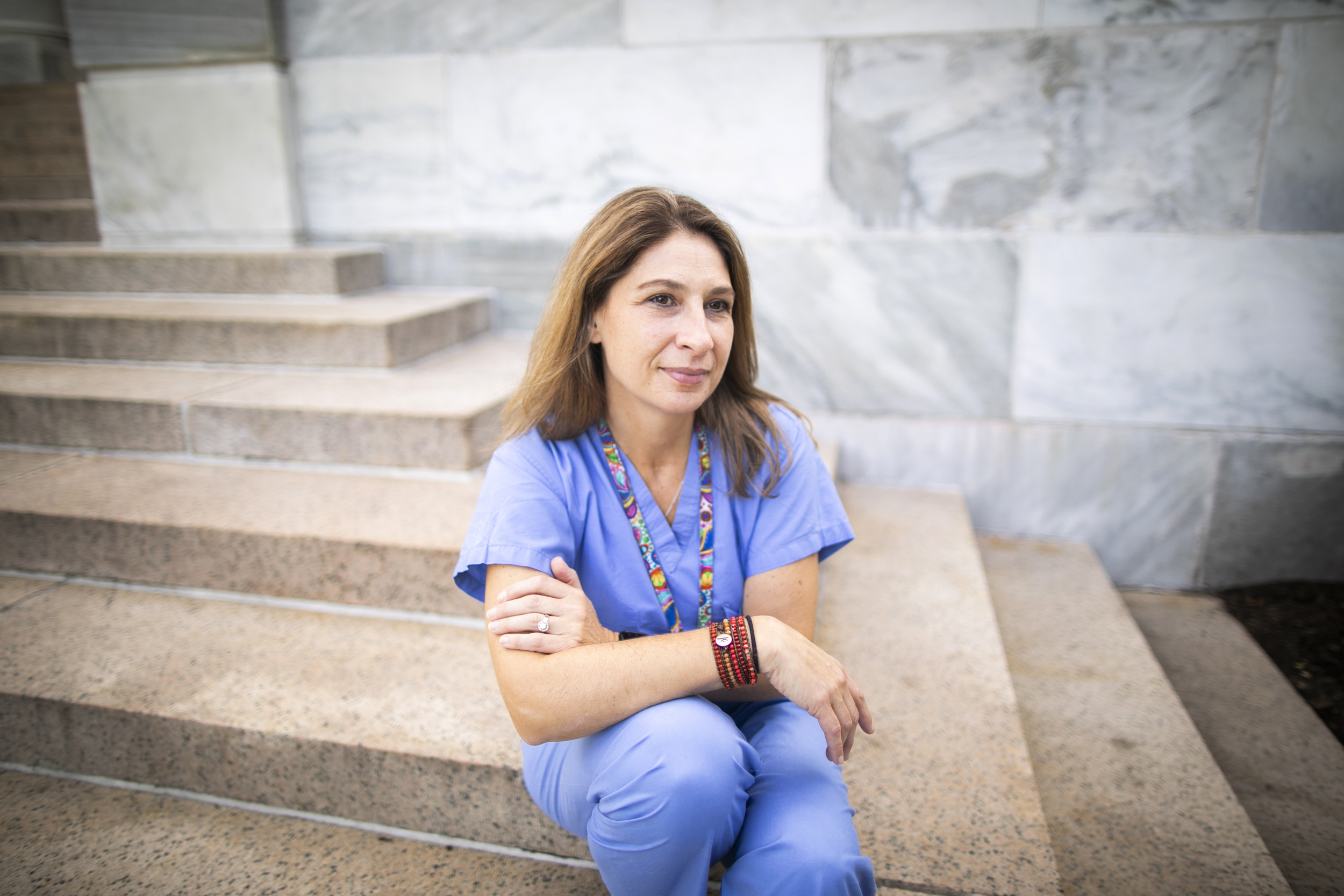
Michelle Covell
Brigham & Women’s Hospital
As a medical intensive care unit nurse, I have been working through the pandemic in the same capacity from the start. The most stressful time was opening the first special pathogens unit (SPU). The intensive-care units were unrecognizable, with large numbers of very sick patients. Nurses, doctors, respiratory therapists, and physical therapists were pooled together from all over the hospital to help care for the patients. With all the personal protective equipment we were wearing, you could not identify who a person was or their role on the unit, so we put tape with our names and roles on our scrubs and instituted a shift huddle so people could briefly get to know each other and what was happening with their patients. As a charge nurse, I had to figure out who were the sickest patients needing the most support. I would try to keep morale going by assigning breaks and lunches. When my spouse, also a Brigham nurse, was deployed to the SPU, we worked opposite shifts so one of us could be home to manage remote learning for our eighth-grade twins. Members of our community wanted so desperately to help that a group of parents delivered dinners to our house three days a week for two months! Whether a homemade meal or just pizza delivery, it always arrived with a lovely note of support or some flowers, something positive and encouraging that helped us get through this time. These meals lifted a huge weight off our shoulders, and we are forever grateful to everyone for their support. The selfless acts that seem small but have a huge impact for the greater good are what bring me hope.
***
“We would go home to shower not just because we didn’t want to risk exposing loved ones, but to attempt to wash off trauma, wash away the guilt of wondering if we could do more.”
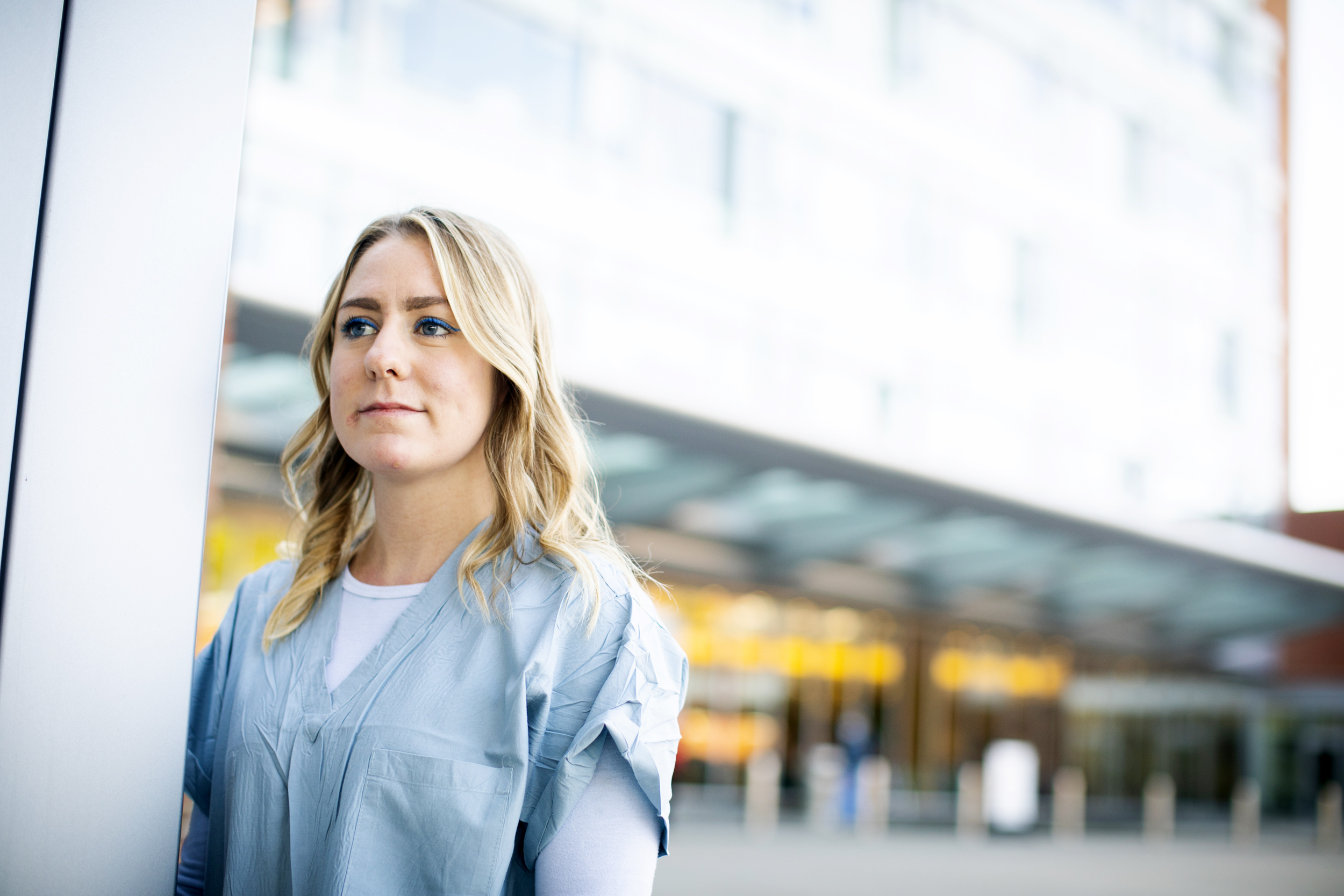
Grace DeFrank
Mount Auburn Hospital, Cambridge
During the beginning of the pandemic there was no questioning — we showed up, we did what we had to do. We would go home to shower not just because we didn’t want to risk exposing loved ones, but to attempt to wash off trauma, wash away the guilt of wondering if we could do more and not spending quality time with our patients in their last moments. Death became commonplace. Nevertheless, sad and defeating. I had lost sight of myself as a nurse. If anything, the pandemic opened my eyes to how incredible health care workers are. We truly had each other’s backs and kept each other going. While working through COVID-19 will always affect me as a nurse, I refuse to let it define my nursing career. I’d like to think it pushed me into wanting more for myself in my career. I craved something new, something I hope to find more fulfilling. I am all of three shifts into a new job in the nursery and I can’t even try to explain how good it feels to hear, “Time of birth, 5:39 p.m.”
***
“The effects of the pandemic on the lives of mothers giving birth under these extreme conditions and the impact on their babies is something I still struggle to process.”
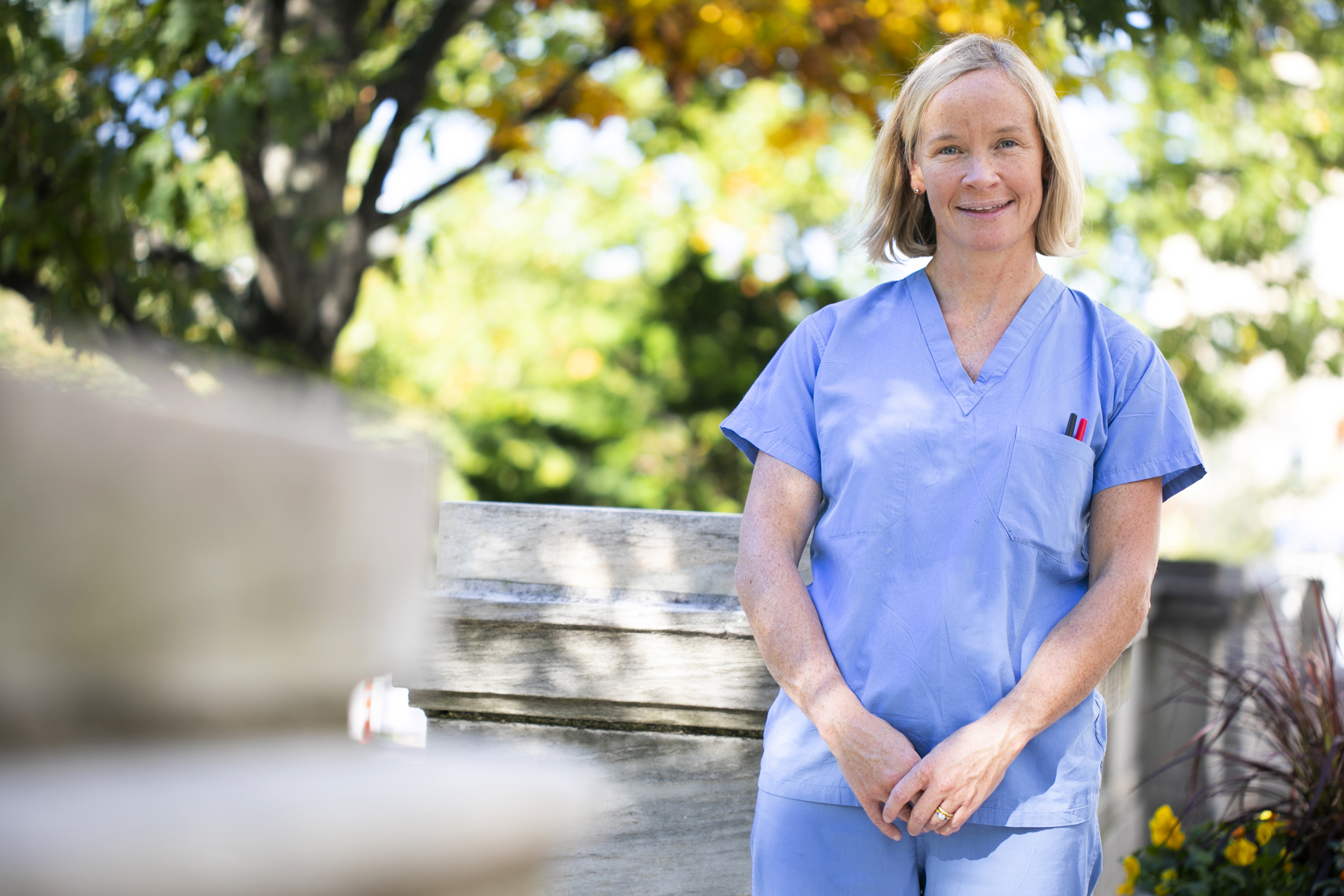
Sonya Elenbaas
Beth Israel Deaconess Medical Center
The pandemic shook our world, and the health care community in particular over these past 18 months. The effects of the pandemic on the lives of mothers giving birth under these extreme conditions and the impact on their babies is something I still struggle to process. As a neonatal intensive care unit (NICU) nurse at Beth Israel for the past 21 years, I have never experienced a crisis quite like this, despite the life-and-death nature of my job. There is a layer of complexity in treating moms and infants during a pandemic that necessitated the collaboration of clinicians from all areas of expertise in the NICU and labor and delivery units to minimize the risks of transmission of the virus and the potentially grave effects on our patients. My role as a nurse never felt more important or more valued than during this time. The innumerable gestures of gratitude from patients’ families, from our own families and friends, and from the world outside of the hospital were astounding and incredibly uplifting for all of us as health care workers. Reflecting on the past 18 months, I feel a sense of pride at having been part of a team of health care workers who found creative solutions to how we could safely care for high-risk infants born to COVID-positive mothers while not diminishing our responsibility to provide life-saving care. I see the progress that science and the understanding of the virus has brought to our level of care and the lives of our patients, and their families, and it gives me a feeling of relief as well as hope.
***
“These patients were parents, grandparents, sons, daughters, neighbors, and friends, all fighting this horrible virus alone in an isolated room.”
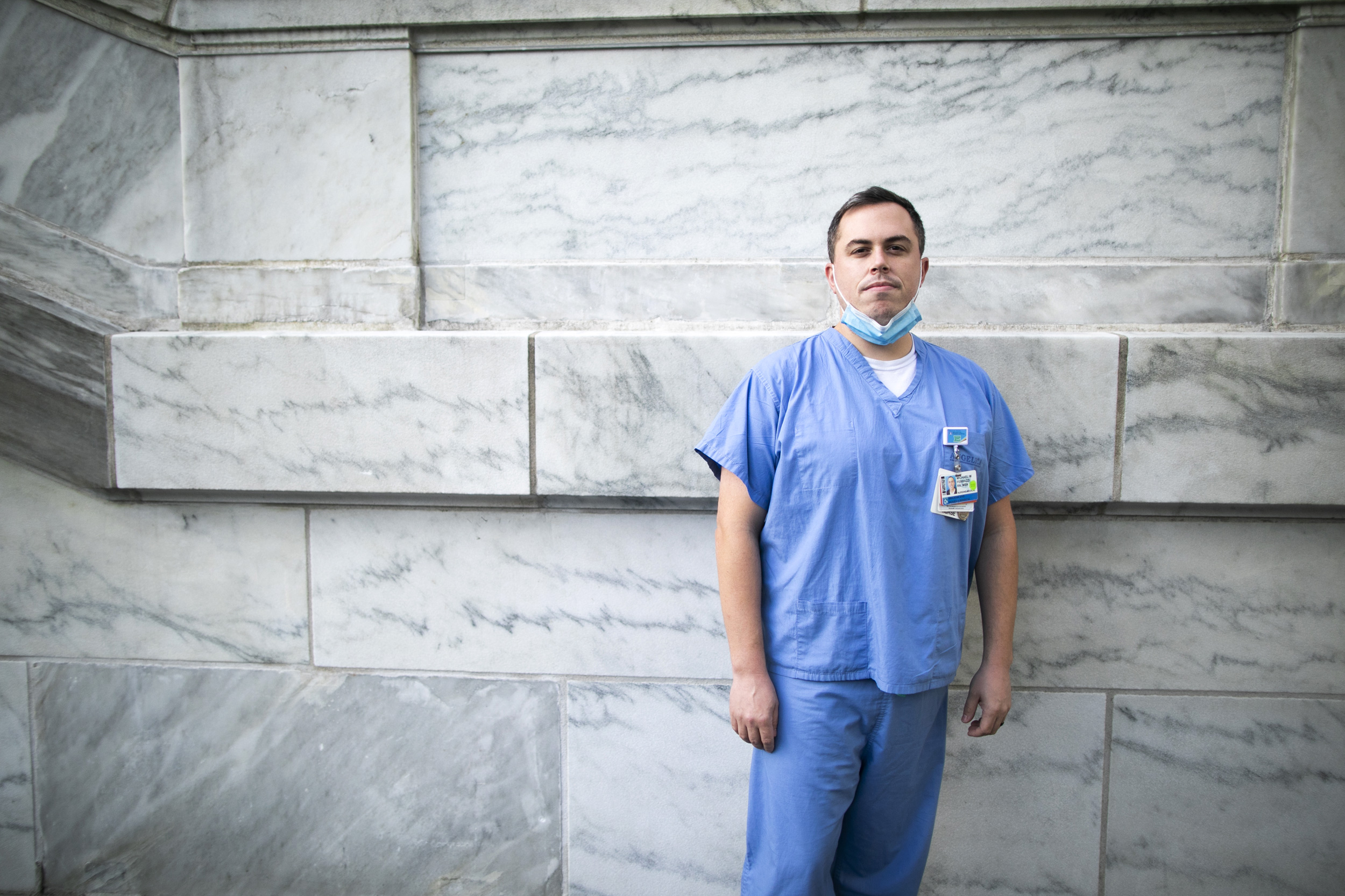
Michael Ferrazzi
Brigham & Women’s Hospital
I transferred to the medical intensive care unit from one of the medical step-down units during the beginning of the second surge back in the fall of 2020. I had no idea what I was getting myself into. To say I was overwhelmed and scared is an understatement. Seeing with my own eyes how critically ill with COVID-19 these patients were was truly eye-opening. These patients were parents, grandparents, sons, daughters, neighbors, and friends, all fighting this horrible virus alone in an isolated room. We utilized FaceTime and Zoom so our patients could see and communicate with their loved ones on a screen before we had to use a breathing tube to treat their deteriorating respiratory status. Unfortunately, for many this was the last time they saw their loved ones. Through all this hardship, I witnessed extraordinary teamwork with disciplines across the Brigham. Caregivers were working in unfamiliar areas with a common goal to care for and support these critical patients during an unprecedented time. I’m afraid we could experience another surge again, but I remain hopeful for a light at the end of this very dark tunnel.
***
“At first we were all fearful, worried about bringing COVID home to our families. But once we started taking care of these incredibly sick patients, we just did what needed to get done.”

Lisa McNeil
Massachusetts General Hospital, Boston
I treated COVID-19 patients during both surges. I tried to make calls twice a day to update family members. In the beginning, we used our own phones to help them FaceTime, and later, the hospital was able to get a computer in every room, just so they could hear their voices. After 30 years in the intensive care unit, I’ve learned I’m here to help the patient, and the patient’s family. I lost my mother when I was young, and I’ve never forgotten how an incredible team of nurses and doctors helped me through. Their support ensured I wouldn’t carry that tragedy as a burden for the rest of my life. I try to bring that approach to the families I work with. Mass General has also supported us in every way. In the early days, volunteers from other parts of the hospital ensured we were putting on and taking off our protective equipment correctly to avoid any contamination. That was crucial in the beginning, and I am so grateful to them. I liken it to what the military must go through when something bad happens. Everyone just steps up to help. At first we were all fearful, worried about bringing COVID home to our families. But once we started taking care of these incredibly sick patients, we just did what needed to get done.
***
“To the family members who lost loved ones to COVID and were not able to be at their bedsides, please know they were not alone. We held their hands, we wiped their tears as we wiped our own, and we prayed for them as well as for you.”
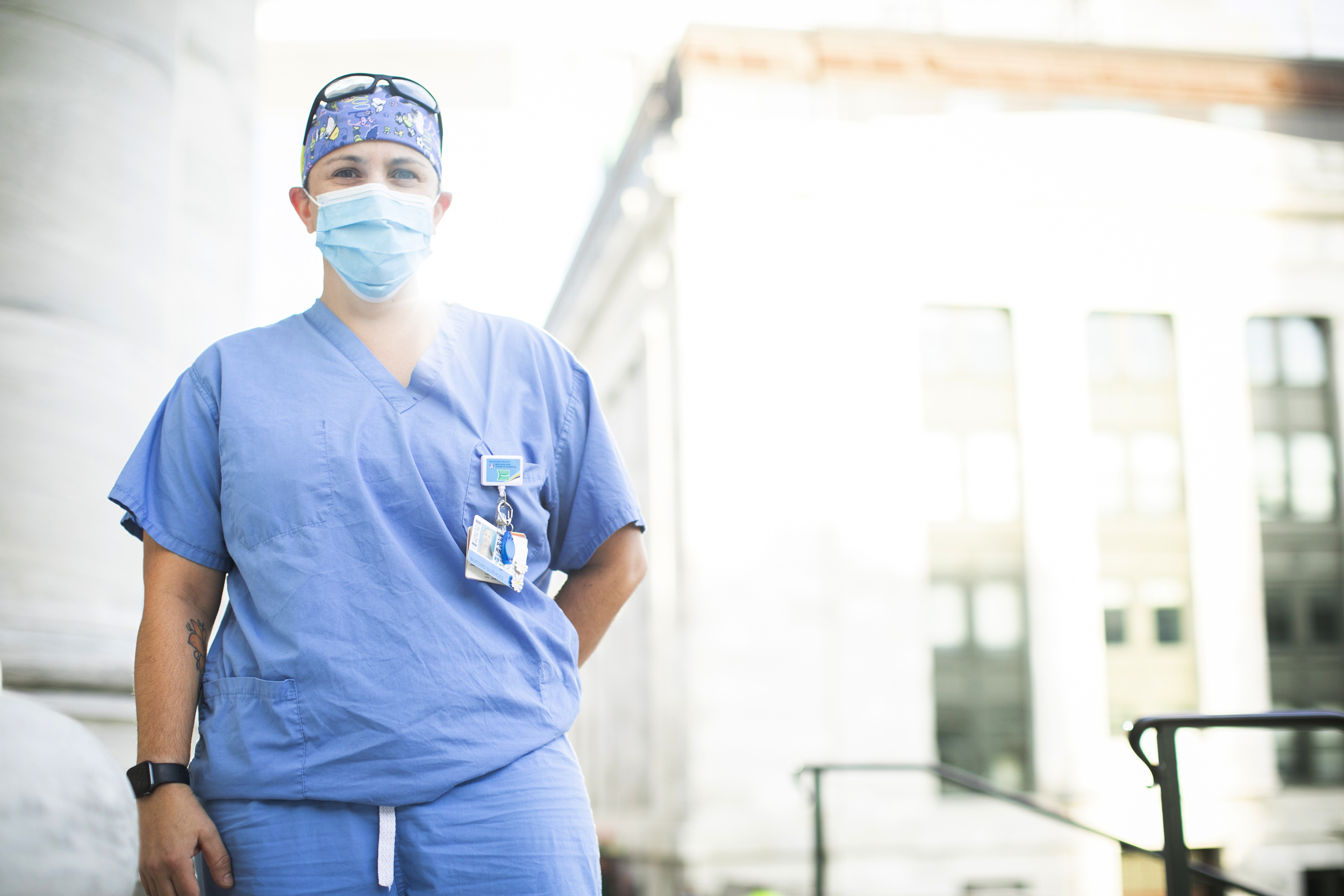
Jane Postizzi
Brigham & Women’s Hospital
For most of my nursing career, I have worked on an intermediate medical unit that treats patients with a multitude of complex and chronic issues. These patients can become critically ill, and as medical professionals, we rely on our experience and education to help support them through such difficult times. It wasn’t until I worked directly with patients infected with COVID-19 in the special pathogens unit that I felt all that gained experience and intuition were essentially useless. I learned to accept the harsh unpredictability of COVID and harnessed my energy toward what I felt I could control: patient comfort and care. It was never lost on us that these patients were more alienated than the greater hospital population. The hospital provided means for patients to virtually communicate with their loved ones and, although this was deeply appreciated, it did not replace the importance of holding that person’s hand when it was needed most. We witnessed patients say goodbye to their families over Zoom and then we stayed by their sides. To the family members who lost loved ones to COVID and were not able to be at their bedsides, please know they were not alone. We held their hands, we wiped their tears as we wiped our own, and we prayed for them as well as for you.
***
“I never imagined I would begin my nursing career during a pandemic. Although I was excited to see what I could do as a nurse, I was also nervous as my floor became a COVID unit within a week.”
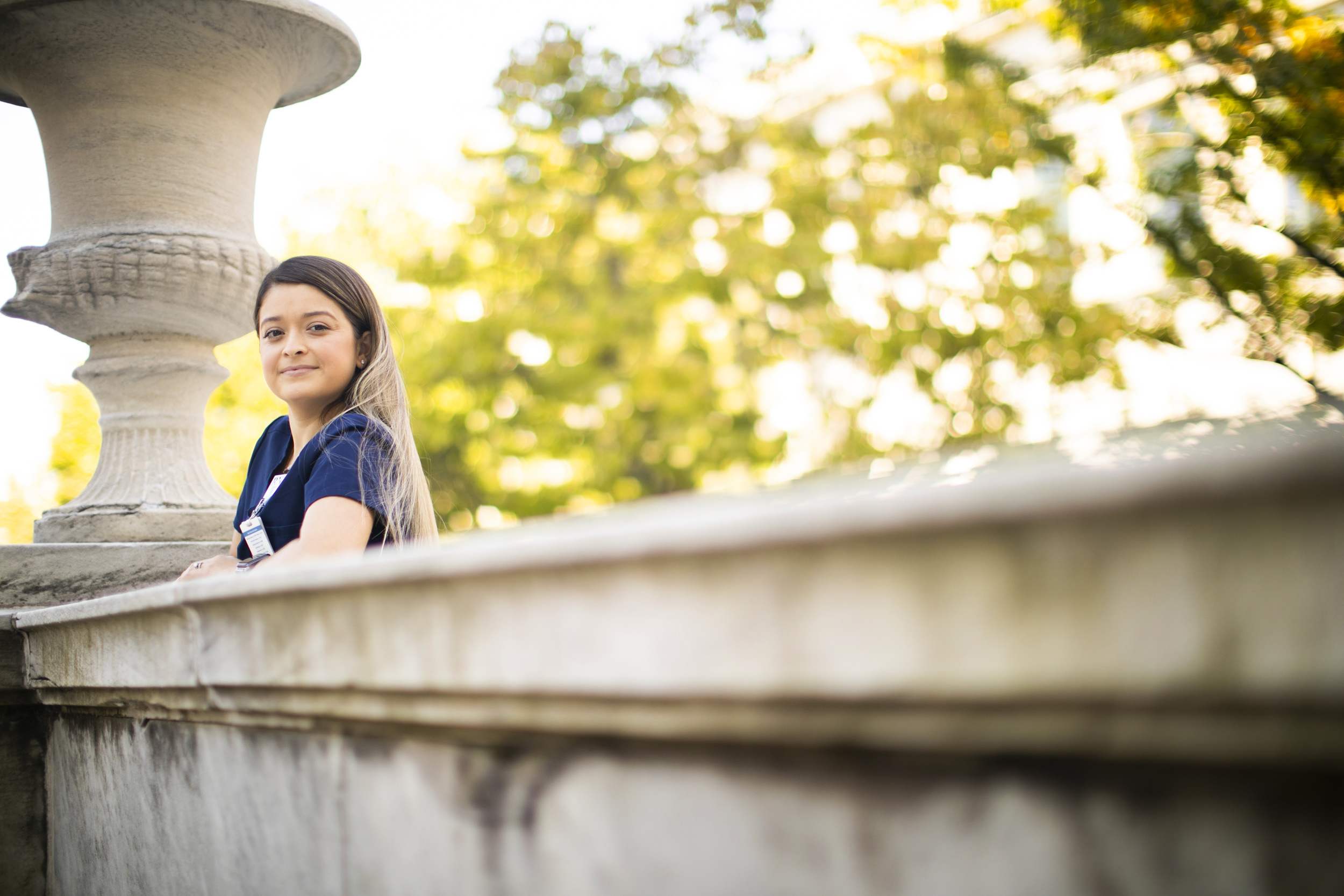
Madelin Puleo
Massachusetts General Hospital
I never imagined I would begin my nursing career during a pandemic. Although I was excited to see what I could do as a nurse, I was also nervous as my floor became a COVID unit within a week. One of the hardest things was seeing how quickly patients deteriorated. The worst part was that they could not have their loved ones at their bedsides. It was difficult to watch patients suffer physically and emotionally. Luckily, we were able to facilitate Zoom calls, allowing patients to see and speak to their families even if it was on a screen. In the beginning, we had little information about this disease. Hospitals saw a shortage of personal protective equipment and that terrified health care workers. We were afraid of getting COVID and spreading it to our loved ones. Months later this fear came true. I got sick with COVID despite having followed protocol. Luckily, I only experienced mild symptoms, and I got through it with the help of family and my husband, who was my rock. I am also extremely thankful for my co-workers’ support. From the beginning, everybody was so wonderful, teaching me how to become a great nurse, despite facing one of the scariest times in their careers. It was such a relief knowing no matter how unprepared I felt, they made sure I was ready to take care of these patients; I knew I was not alone in this fight. The year 2020 was not what any of us expected, but it taught me to be thankful for the small things and to appreciate life more.
***
“As we tackled this, we went from being hailed as heroes to being utterly overwhelmed by the constantly evolving policies, procedures, and guidelines that the pandemic created.”
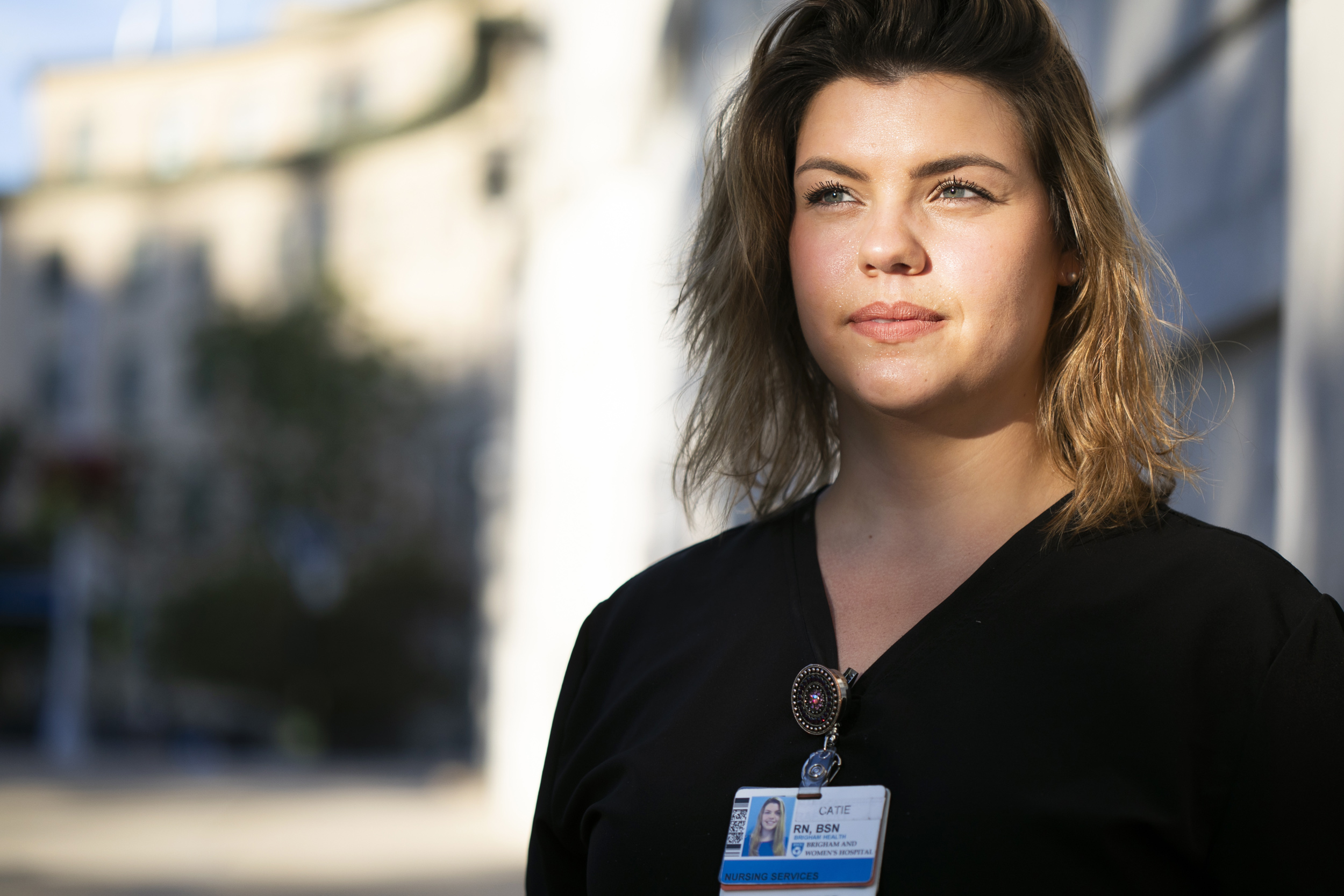
Catie Raftery
Brigham & Women’s Hospital
Working as a nurse during a pandemic has been a humbling experience. What I presumed would be a smooth intro to intermediate medical nursing quickly shifted when the pandemic hit four months into my first hospital job. All of a sudden, we were immersed in this deadly pandemic, and a few months later, I was relocated to the COVID unit. There, our task was to treat patients with an illness marked by enigmatic spread and elusive cure, one which threatened to upend the lives of all those in its path. As we tackled this, we went from being hailed as heroes to being utterly overwhelmed by the constantly evolving policies, procedures, and guidelines that the pandemic created. In addition, we juggled comforting families only able to see their loved ones through the screens of iPads; holding the hands of those who feared for their lives; consciously deciding to spend additional time with patients who expressed feelings of loneliness and seclusion; and battling the constant fear and anxiety of exposing ourselves or our families. Although it may take years to process all these events, I know that every day I show up, give my all, and strive to bring hope, peace, comfort, and joy to every single person I encounter. It has been my greatest honor to be able to be a registered nurse in a time like this.
***
“These hard times have molded me into a more patient, caring, and empathetic person, both at my workplace and in my everyday life.”
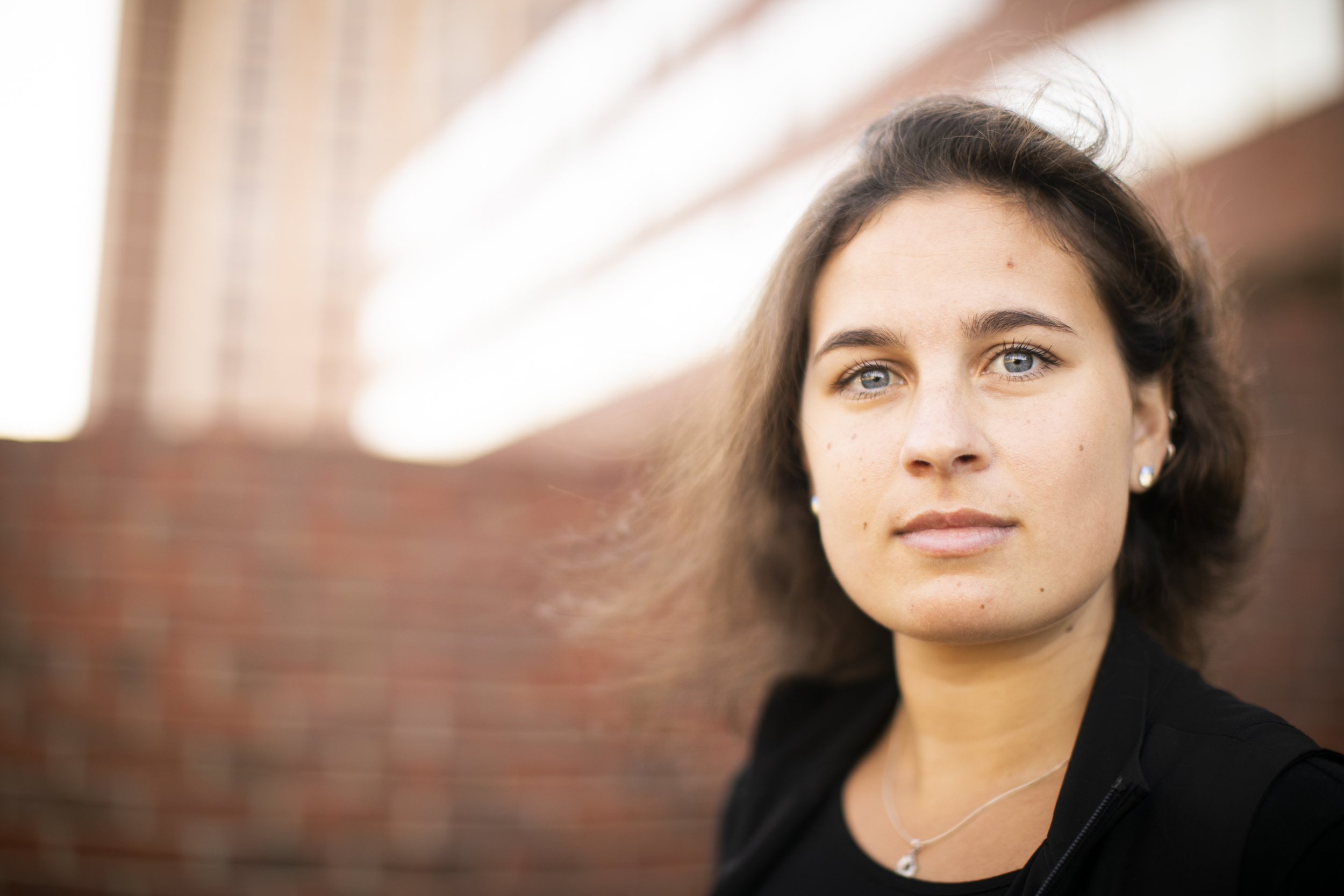
Tatiana Raufi
Mount Auburn Hospital
I have been a nurse for two years now and over the last year alone, I have had experiences I never expected to have so early in my career. To put it bluntly, it’s been an emotional roller-coaster. I cannot emphasize enough how much I value the powerful bonds that I have created with my co-workers, my second family. Being at the bedside of those sick with COVID-19 has been psychologically and physically exhausting, but I’ve learned how critical my role as a nurse is in bridging a connection, with consistent communication with patients and their loved ones. There are many times I had to be the voice of my patient, whether it was relaying what was needed from the medical team or providing continuous updates to those they care about but who were unable to come into the hospital. These hard times have molded me into a more patient, caring, and empathetic person, both at my workplace and in my everyday life. Despite the tragedies I have witnessed, I am grateful for all I have learned and for who I have become.
***
“I had a 6-month-old at the time. Then, five days before our peak surge numbers in the hospital, I found out I was pregnant.”
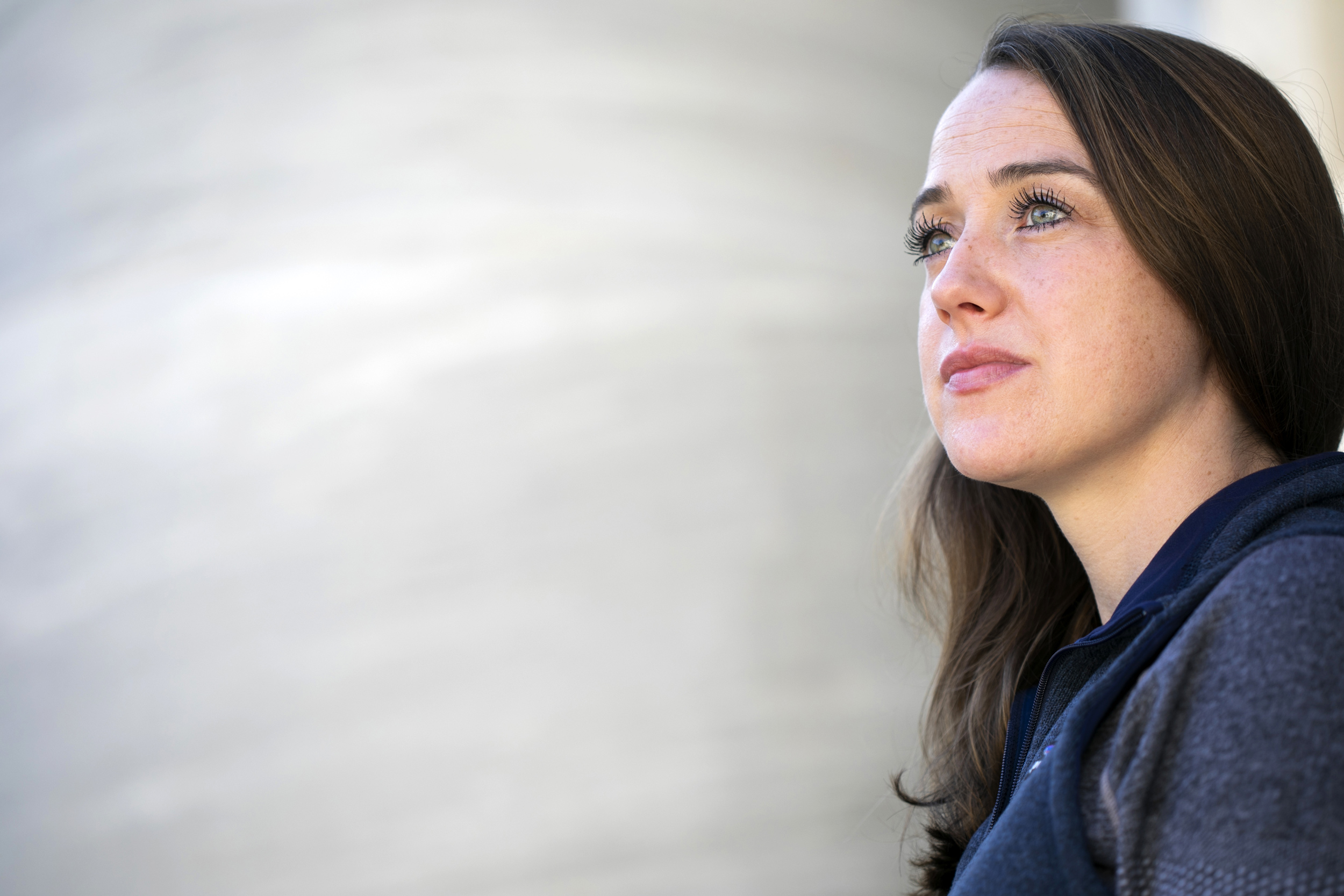
Caitlin Sullivan
Massachusetts General Hospital
In my 12 years as a nurse, I never anticipated anything like this. Being scared and overwhelmed are the feelings that really stand out to me from March and April of 2020 — going to work every day not knowing if I was going to get sick or bring COVID-19 home. I had a 6-month-old at the time. Then, five days before our peak surge numbers in the hospital, I found out I was pregnant. I remember holding my son after a shift and thinking, “I can’t get this. I have to stay well for you.” I also remember the complete devastation the virus caused among our most vulnerable, and how ruthless it was. At first, we saw older patients with comorbidities. Then we started seeing people in their 40s and 50s who were otherwise healthy. Our most intensive therapies were no match for the virus. In the beginning, no families were allowed to visit, so we were the only ones with patients in their final moments, holding their hands. That stays with you. To cope, we relied on our co-workers. We cried together, supported each other, and just rallied together and found strength in one another because we shared that unique bond. The people I work with are truly incredible. We really couldn’t do what we do, or what we have done, without each other.
***
“How do I tell a neonatal intensive care unit nurse her assignment today is to hold the iPad for the family of a dying adult intensive-care unit patient so they can say goodbye?”
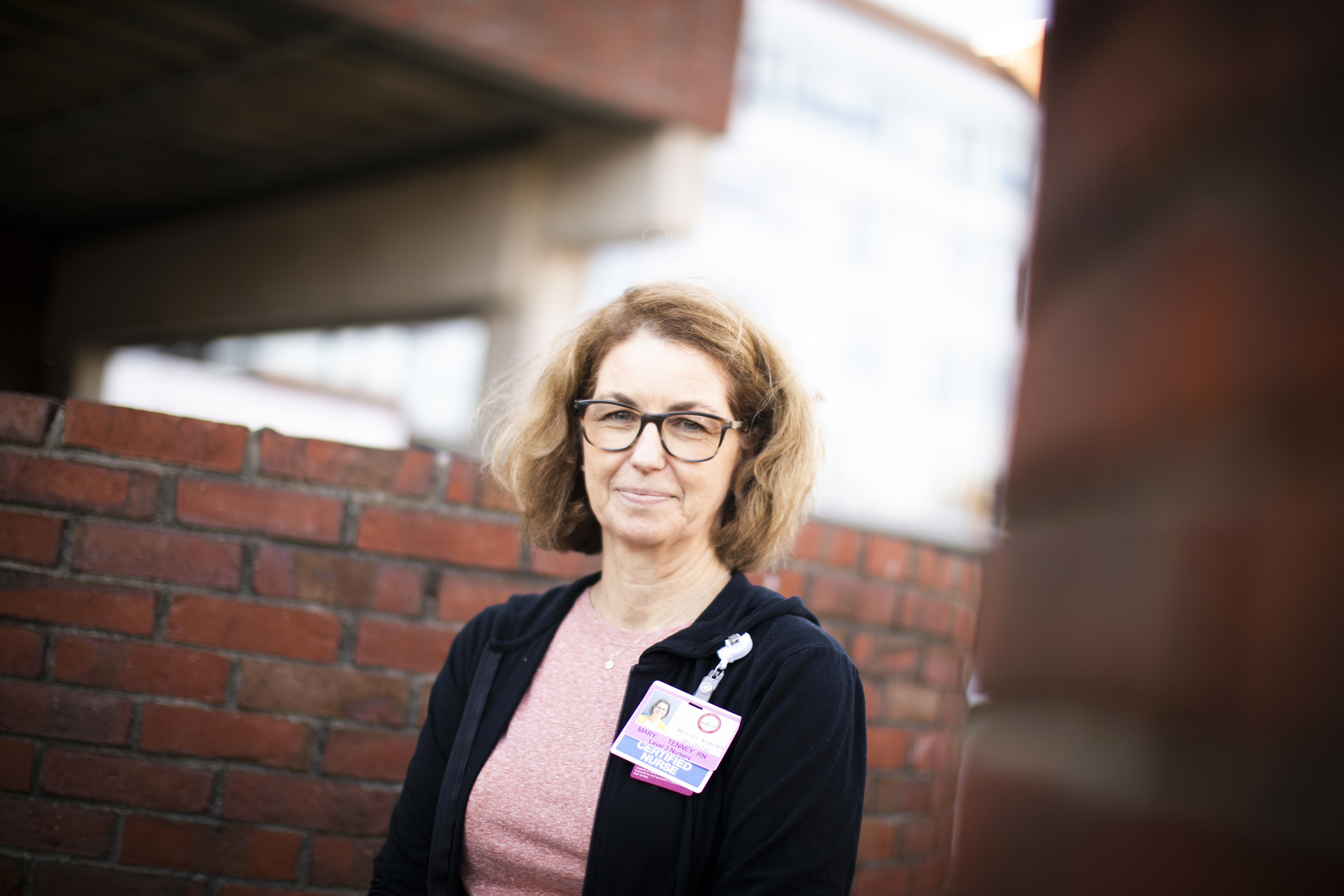
Mary Tenney
Mount Auburn Hospital
To the non-nursing community, I am the head nurse, the supervisor of nurses, the one who takes care of things like staffing and budgeting, but it’s actually so much more than that. On Feb. 28, 2020, I attended a hospital leadership meeting where we learned of a confirmed case of COVID-19 in California. My immediate thought was, “Just like Ebola, we’ll painstakingly make sure staff know how to use personal protective equipment but then never actually need it.” Within two weeks, I realized how naive that notion really was. To say supporting the nurses who reported to me was a challenge is a gross understatement. My job as their nurse manager is to make sure they are providing safe and quality care, but to also educate to protect them from harm. How do I teach them new ways of utilizing PPE, to extend the lifespan of their PPE? How do I tell a neonatal intensive care unit nurse her assignment today is to hold the iPad for the family of a dying adult intensive-care unit patient so they can say goodbye? I did it with empathy, encouragement, and positive reminders of why we all became nurses.
***
“The tears from my colleagues were real. The fear in their eyes was real. The compassionate care they provided to every patient coming into our emergency department was real. And the pride I have for my colleagues is real.”
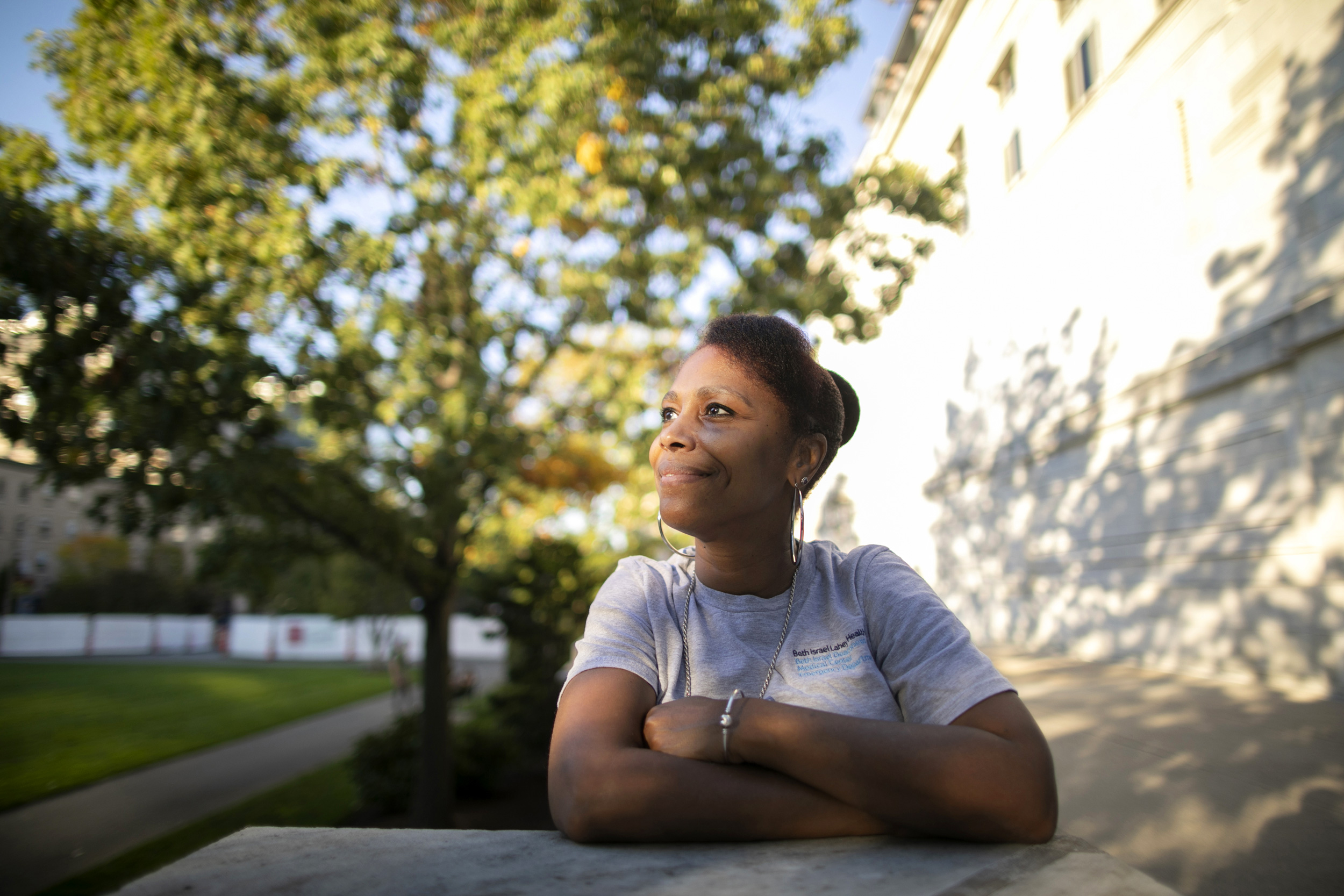
Roxane White
Beth Israel Deaconess Medical Center
The end of 2019 was difficult, bringing us many challenges in the emergency department — and this was before COVID hit. While we were devising a plan to turn things around, 2020 reared its ugly head and brought us COVID. We didn’t know what to expect and were understandably afraid, however, it took a pandemic to help bring our team together. Every staff member in our department banded together to get through this thing together. We ensured each of us wore the proper personal protective equipment, despite the frequent changes to protocol. We listened to one another’s fears and raised each other’s spirits every day. We worked equally hard for the COVID patients who came in. The tears from my colleagues were real. The fear in their eyes was real. The compassionate care they provided to every patient coming into our emergency department was real. And the pride I have for my colleagues is real. This togetherness could be felt throughout the medical center, and it was a good feeling. Once you’ve been through a pandemic with your colleagues, you have a special bond that will last a lifetime.





